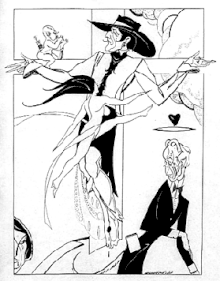The Master of the House
The Master of the House is a novel written by Radclyffe Hall and published in 1932 — her first published work after her 1928 The Well of Loneliness.[1] It depicts the life of carpenter Christophe Benedit, as well as of the other inhabitants of the small French town of St-Loup-sur-Mer.
.jpg.webp)
Una Troubridge — Hall's partner — described the novel as being about a "modern Christ figure";[2] the University of London has noted speculation that Hall wrote it as "expiation" for having inspired Beresford Egan's "blasphemous" cartoon of Hall being crucified.[3]

The Spectator considered that it was "a solid, full story", with "a high seriousness of purpose", but faulted Hall's use of symbolism, claiming that this makes the story "totter dangerously".[4]
Hall's biographers have been divided over the novel's quality, with Sally Cline (in her 1997 Radclyffe Hall: A Woman Called John) describing it as Hall's "greatest novel",[5] and Richard Dellamora (in his 2011 Radclyffe Hall: A Life in the Writing) stating that it "disappoint(ed ...) nearly everyone" and "diminished both Hall's reputation and the size of her [readership]"[6]
It was republished in 2013 by Wylie Press (ISBN 978-1473311886).
References
- Hall, Radclyffe (2016). 'The world' and other unpublished works of Radclyffe Hall. Funke, Jana, 1982-. Manchester, UK. ISBN 978-0719088285. OCLC 930758560.
{{cite book}}: CS1 maint: location missing publisher (link) - A Martyr to Sex and Literature, by Thomas Mallon, in the New York Times; published September 8, 1985; retrieved May 29, 2018
- Publishing Queer in the Twentieth Century: Master of the House, at Senate House Library, University of London; retrieved May 29, 2018
- FICTION, in The Spectator, published March 5, 1932; retrieved May 29, 2018
- The literary lesbian, in The Daily Telegraph; published June 28, 1997; retrieved May 29, 2018
- Radclyffe Hall: A Life in the Writing, by Richard Dellamora, published May 31, 2011 by University of Pennsylvania Press